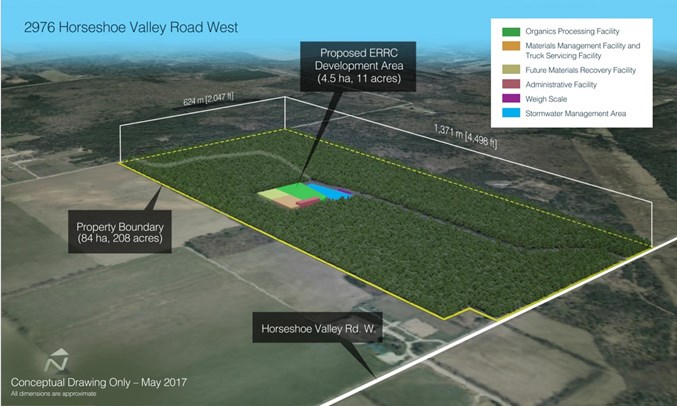With funding for the County of Simcoe’s Environmental Resource Recovery Centre project (ERRC) in jeopardy due to delays, county council decided to take action to move forward on the project this week.
During an in-camera session this week, council approved a motion to request a minister’s zoning order from the Minister of Municipal Affairs and Housing to expedite the development of the new waste processing project, to be located in Springwater Township, north of Barrie.
The project has been in a holding pattern while it goes through the Local Planning Appeal Tribunal (LPAT) process, which a zoning order would, effectively, circumvent.
However, some of the appellants of the project believe their rights to question the government may be taken away if the order is approved.
“If we look at David and Goliath as an analogy, they’re taking away our slingshot and our rock,” said Mary Wagner, president of the Friends of Simcoe Forests, which is one of the appellants to the county project. “It’s a really sad state of affairs that the ministry can do that.”
The ERRC project was first proposed by the County of Simcoe in 2010 as part of its waste management strategy. The facility would receive the county’s organics and recycling to be broken down into compost, fertilizer, or fuel for use in the county.
After the county said it considered more than 100 sites for the facility, they applied to the province for permission to build the facility in the middle of the Freele Tract of the Simcoe County Forest after receiving approval on the location from Simcoe County council.
The Ministry of Municipal Affairs and Housing approved the county’s request earlier this year and granted an official plan amendment to allow the facility in the forest. However, the three groups appealed the decision: the owners of Nicholyn Farms which is adjacent to the Freele Tract, Edward Kracjir, and local environmental advocacy group Friends of Simcoe Forests.
All three appellants have stated publicly they don’t oppose the ERRC project as a whole; they only oppose the site chosen by the county in the middle of a Simcoe County Forest.
“We’ve been using the process that’s available to the average citizen to argue with the government that what they’re doing is incorrect,” said Wagner. “I think the Friends of Simcoe Forests have shown that on several occasions. We’ve followed the process. Our argument is strong, and it needs to be looked at and dealt with. This is a bypass of that process.”
Overall, Wagner said she will accept the decision of the province, whatever it may be, but has serious concerns about what granting such an order would do to democracy.
“This... undercuts a citizen’s ability to question the government. My question to all citizens would be, is this really a world you want to live in? Because that’s the precedent this is setting,” said Wagner.
According to the update from the County of Simcoe posted on their website this week, the county anticipates that if the project goes through the LPAT at its current rate, it will likely add at least two more years to the process, and it has already cost taxpayers more than $1.5 million to get the project to this point.
A provincial grant received for the project from the Continuous Improvement Fund brought in a total of $2.2 million. If the facility is not operational by the end of 2023, the county will lose that funding.
The minister's zoning order is an option available for all projects requiring Planning Act approvals, but is typically designated for critical infrastructure, which, according to the county, they believe the project falls into.
“While we believe the (LPAT) process is important, the county requires a decision on this project to enable further planning around waste collection, processing and future contracts for processing, transferring and collections,” reads the release.
Currently, county landfills are filling up so fast it's costing the county, and therefore taxpayers, $1.65 million a year to transfer some of its waste to Hamilton, and the cost is only going up. Landfill space in Simcoe County is expected to be fully at capacity within seven years.
If the minister's zoning order, or MZO, is approved by the province, the county will still be required to go through a detailed environmental compliance approval process, which allows for public participation.
“We respect the input and concerns of the neighbours and we have committed to working with them through this process. Further approvals, studies and consultation will occur. Their voices, as well as input from Springwater Township, will be heard,” Simcoe County Warden George Cornell said Friday. “This is critical infrastructure and council was satisfied that the conditions of this project met the criteria to request an MZO. We are hopeful the province will consider the request.”
For more information on the county’s ERRC project, click here.
